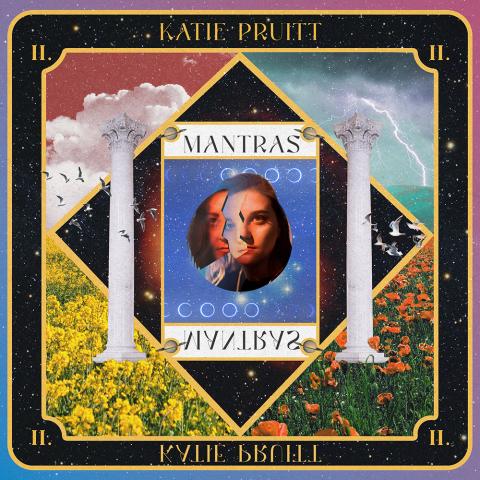
Musician Katie Pruitt. (RNS/Alysse Gafkjen)
"All my friends are finding new beliefs," Katie Pruitt sings on the opening track of her sophomore album, "Mantras."
Pruitt, a queer singer-songwriter based in Nashville, Tennessee, writes music that, with agile vocals and catchy guitar riffs, explores the fraught nature of leaving one’s childhood faith.
In one of the album’s singles, "White Lies, White Jesus and You," Pruitt, who grew up Catholic, sings the title’s list, calling them "some things I put behind me." Pruitt told Religion News Service the song speaks to the people who have made her feel "less than" by trying to fix her.
"The way I felt the knife turning into my side/ When I heard you say the words, ‘I’ll pray for you,’" Pruitt sings in a music video that depicts a queer love story unfolding at a Christian summer camp, replete with classic Catholic plaid skirts.
A recent survey from the Public Religion Research Institute found that 11% of Americans are former Catholics, a number roughly in line with other surveys. And across all the people PRRI surveyed, 47% of those who left their religion cited "negative teaching about or treatment of gay and lesbian people" in their decision.
As Pruitt, who uses she and they pronouns, told RNS: "I’m finding my own lens to view and experience spirituality through. And just because it’s not the same as yours doesn’t mean it’s wrong."
Pruitt said they purposely wrote about a white Jesus to reflect the way their understanding of Jesus has changed from the "blue eyed, white, six-pack abs version of Jesus" they grew up with, a version of Jesus Pruitt now understands as one "people have made up over time, not the version that’s actually depicted in the Bible."
Jesus, Pruitt said, "had dark skin, and he was kind of a radical, progressive-thinking dude" who "was friends with prostitutes, and he was friends with everyone," Pruitt added.
Pruitt said her religion professor at Belmont University, David Dark, was one of the people to introduce her to this different understanding of Jesus, citing his book, Life’s Too Short to Pretend You’re Not Religious.

Katie Pruitt’s “Mantras” album cover. (RNS/Courtesy image)
Pruitt interviews Dark in her podcast, "The Recovering Catholic," which she began hosting after releasing her 2020 debut album, "Expectations." In her podcast, Pruitt said that Dark was her professor when she was struggling with her sexuality and that he explained to her "then and now how the clobber verses had been taken out of context," using a term for the Scripture passages often cited in anti-LGBTQ+ teachings.
But the majority of Pruitt’s podcast interviews are with other musicians, including boygenius’ Julien Baker and queer Christian artist Semler, where Pruitt and her guests talk about their complicated relationships with faith and God.
Like Pruitt sings in the album opener, many of their friends are exploring their own spiritual journeys, with some getting involved with meditation and yoga and others still "very Christian," Pruitt said.
"I’ve taken bits and pieces from everyone that I know," Pruitt said of their own spiritual journey.
While Pruitt is still wrestling with big spiritual questions, The Recovering Catholic’s second season will be more focused on the intersections between faith, politics and everyday life, including an interview with Amy Ray of the Indigo Girls, Pruitt said.
"The past couple of years I’ve just been trying to figure out what spirituality means to me outside of the context of organized religion and all of the different ways that I feel connected to something bigger," Pruitt said, adding that the label "recovering Catholic" still fits.
In "Expectations," Pruitt explored the challenges of self-acceptance and coming to terms with their sexuality against the backdrop of Catholicism.
In "Loving Her," a song Pruitt wrote after a hard conversation with her dad, she sings, "If loving her’s a sin I don’t wanna go to heaven/ No there’s nothing else up there I could need." Another song on the album, "Georgia," speaks to Pruitt’s fear of her parents’ reactions to her coming out.
Pruitt continues delving into their parental relationship in "Mantras," where they sing from their parents’ perspectives about being "blood related and tryin’ to relate."
Advertisement
In November, Pruitt posted a TikTok asking her parents what they thought of the song, "Blood Related." Pruitt’s dad praised the song, saying it spoke to the division that’s present in a lot of families.
"You need to work through it and show your love and try to work things together, try to understand each other’s opinion as best you can," Pruitt’s dad told her.
"The relationship between parent and child is the most complicated relationship that we probably have in this life," Pruitt told RNS.
I will give my parents so much credit," Pruitt said, describing them as having expanded their worldview since the release of "Expectations" and as they’ve seen the impact of her music on queer fans at her shows.
Pruitt said their relationship with their parents has taught them patience.
"I think it’s a process of continually communicating and continually trying to understand each other. And sometimes the relationship does just need space," the singer said.
She said it’s crucial to know "when do we need to stop and walk away from this conversation?"
"Life is too short to fight and to argue about little details when really what I want to know is ‘How are you? Like, how’s your heart?’"
But Pruitt recognizes that many queer children of Catholic parents don’t have her experience. "I’ve been lucky that my parents are willing to have those conversations with me," she said. For those who don’t have that experience, "I have all of the empathy in the world," Pruitt said.

Katie Pruitt. (RNS/Alysse Gafkjen)
In a 2021 TED Talk, Pruitt told an audience that, at her first confession, she made up a bunch of sins she didn’t commit.
"Later that night when I was laying in bed, talking quietly to God, I said out loud the words I’d planned to say to that priest. For the first time in my small life, I admitted to myself, with God as my witness, that I was gay," Pruitt said in the TED Talk. But still, that honesty scared them so much that they didn’t talk about it for another decade.
"Songs create this separate safe space for honesty," Pruitt told the TED audience.
Pruitt said that while "Expectations" was more about her struggle to combat "the feeling of wanting to feel accepted for my sexuality, for my queerness," her new album was "a personal journey of learning how to love yourself."
Pruitt said they wrote most of the songs for "Mantras" while in therapy, working to undo negative thought patterns and self-talk. She describes the album as an evolution, away from a need to prove herself and to seek external validation, "whether that be from a deity or my parents," and toward a self-acceptance.
"This phase of my life was really focused on how do I just find intrinsic happiness and have that just come from within," Pruitt said.
Emotional honesty is a core feature of Pruitt’s songwriting.
Pruitt told RNS that songwriting forces them to look at themselves under a microscope. "It’s scary to kind of face the darker parts of yourself and the more vulnerable parts of yourself," they said.
When the intensity of that process makes Pruitt feel overwhelmed, she’s learned that she needs to give herself grace and patience. "I just need to get on my longboard or my bike and or I need to call a friend and just kind of experience the lighter side of existence," which sometimes means stopping to "take a big exhale" and "sit in the grass and just be like ‘you know what, it’s not that serious.’"
As Pruitt gets ready to release "Mantras," she’s been focusing on one in particular: "Love is the absence of control."
Writing "Mantras" was a "really intense process of letting go" of past versions of herself and ideas about what the future was supposed to look like, said Pruitt.
"If you really love something you just kind of need to let it pan out the way it’s supposed to," Pruitt said.







